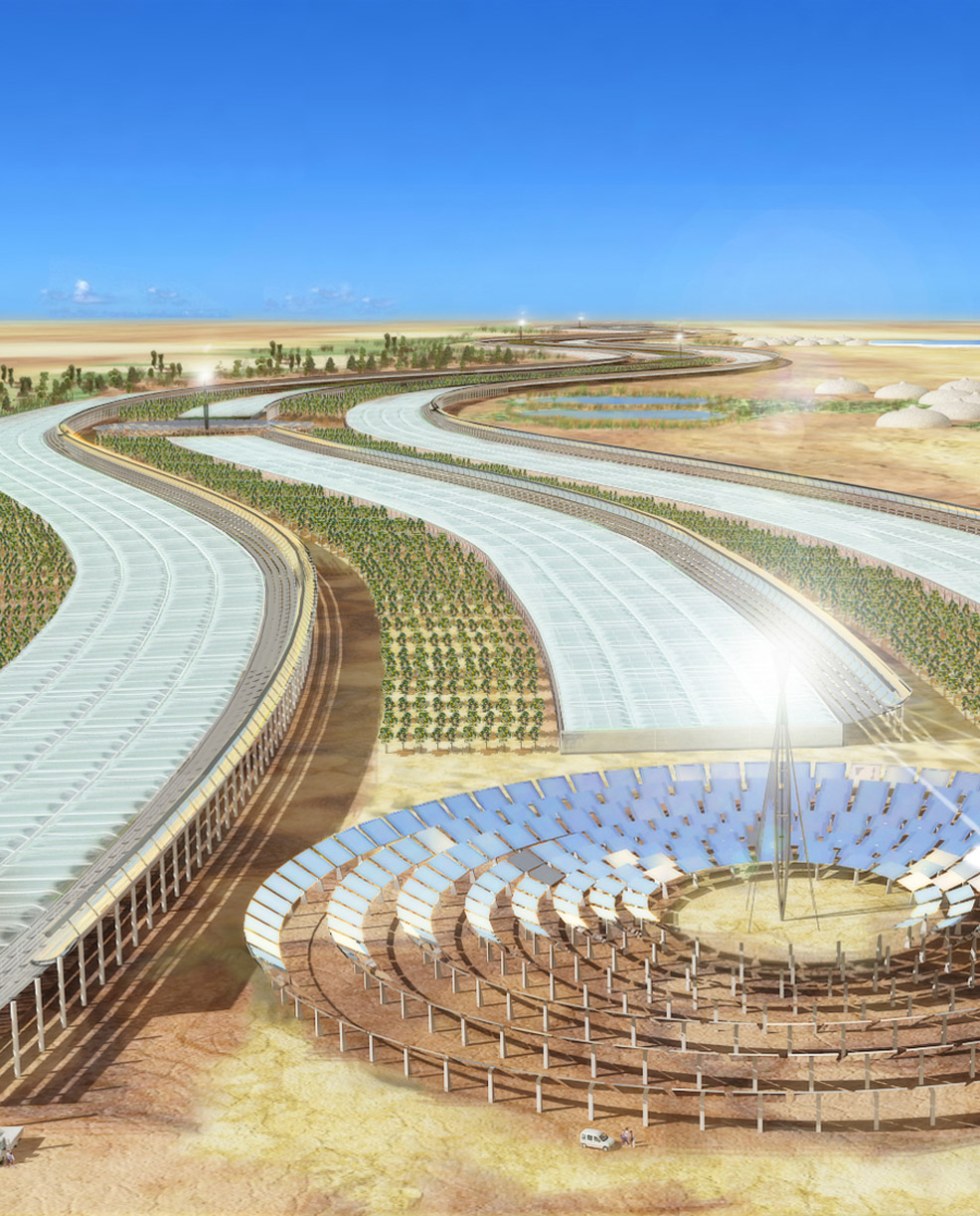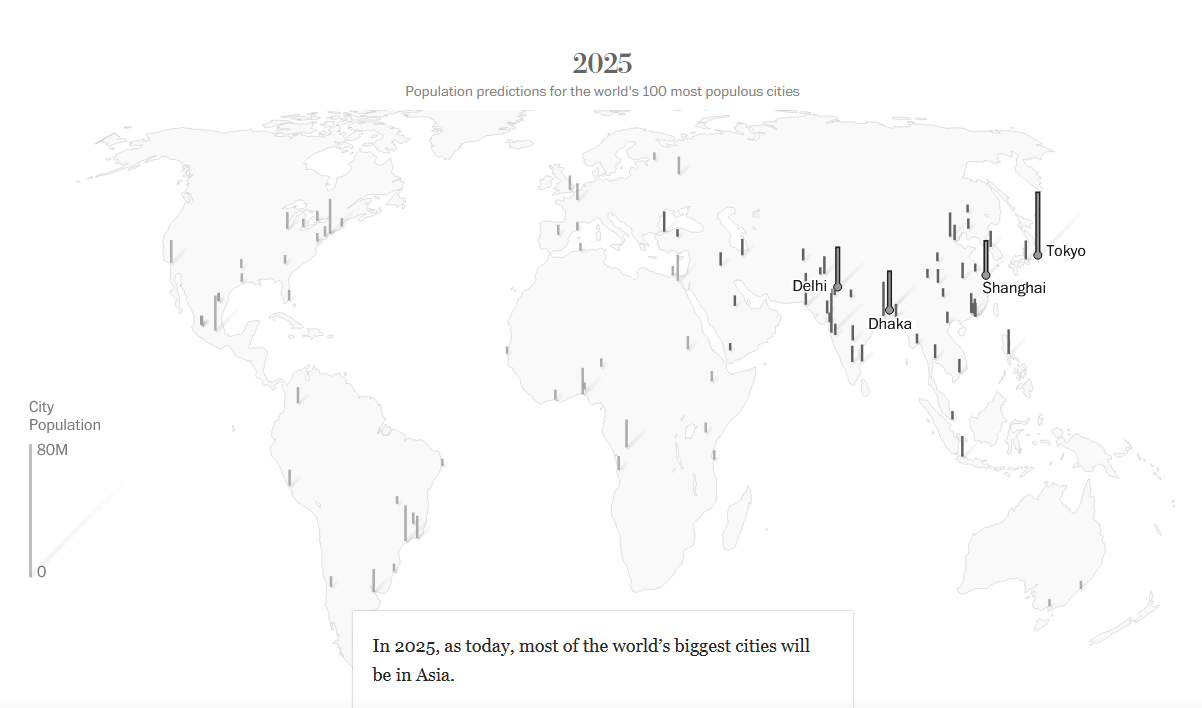Final draft.

This will be going on the timeline shortly (with references to be added).
Comments welcome, although I'd prefer to avoid any major changes.
----------
2100
Africa is a major urban and political centre
Historically, Africa had been poor, with limited influence on the world stage. By 2100, this situation has dramatically reversed.
The 19th century had belonged to Great Britain, while the 20th century had been the American century. Following Asia's rise in the 21st century, the baton is now passing to Africa.
After its colonisation and subjugation by foreign powers, independence movements took place in Africa in the post-WWII period. Devastating famines wracked the continent in the late 20th century, combined with political, economic, and humanitarian catastrophes, limiting its progress.
Africa's economy improved in the early 21st century, in parallel with democracy and the rule of law spreading to more of its countries. Governments began to crack down on corruption and patronage, while macroeconomic growth plans aimed at improving living conditions came to fruition. Millions of Africans flocked to cities in search of jobs and other amenities.
Meanwhile, foreign investors poured vast sums of money into Africa. China, by far the biggest contributor, sought to extract the continent's abundant metals, minerals, fossil fuels, and other resources. This occurred alongside the building of new ports, roads, pipelines, and other infrastructure. China also expanded these investments into agriculture, finance, real estate, technology, tourism, and other emerging fields.
Africa received further support and development from initiatives such as the UN's Sustainable Development Goals for 2030. Other milestones around this time included the expansion of its free trade agreements, the introduction of a single African currency, and the building of a trans-continental road and rail network to all corners of the continent.
In the 2040s, many African nations achieved economic diversification enabling them to attract foreign investment in new areas. Even the likes of oil-rich Nigeria had begun to transition away from older fossil fuel industries. This decade saw ecological restoration efforts completed in the Niger Delta and the final clearing of landmines in countries such as Angola adding a further boost to social and economic development. Meanwhile, some of the richer African nations invested in new coastal defences to mitigate sea level rises.
In Central Africa, the Congolian rainforests had lost two-thirds of their original tree cover by mid-century. Domestic and international agreements aimed at slowing the rate of deforestation came into force, with better monitoring and regulations preventing a complete collapse of the region, although problems would persist for some time into the future.
By 2050, Africa's population stood at 2.5 billion – two and a half times the number in 2009 – and continued to rise.* While other continents had a fertility rate near or below the replacement level of 2.1 children per woman, Africa maintained a figure well above this, having only recently fallen below 3.0.
Improvements in education, economic opportunity, living standards, and medicine transformed much of Africa, with child mortality declining to negligible levels in many countries. Diseases such as dengue fever, HIV/AIDS, and malaria became largely eradicated. By 2050, the average life expectancy in Africa had reached 70 – up from 60 in 2013, 50 in 1981, and just 40 in 1958.
Agenda 2063, a set of initiatives proposed 50 years earlier, achieved most of its long-term goals.* These included further improvements in living standards, education, and health, alongside the enshrinement of democratic values, equality, and human rights. For some African nations still struggling with repressive and dictatorial regimes, these goals would remain out of reach for now. But for Africa in aggregate, a whole new plateau of possibilities had emerged. Agenda 2063 also called for a more united Africa, strengthened by continental institutions to maintain peace and stability.
By now, the earlier transport networks had seen upgrades such as high-speed rail and widespread electric charging/self-driving infrastructure. Major new construction projects included the 'Bridge of Horns' across the Red Sea, linking East Africa with the Middle East, and a 155 km tunnel from Tunisia to Sicily.*
Africa faced severe environmental challenges, being among the regions most vulnerable to climate change. Higher temperatures, changing rainfall patterns, drought, and increased climate variability, all threatened to derail economic and human development. Climate change exacerbated long-standing problems and reignited earlier tensions. At several points during the mid-to-late 21st century, it appeared that Africa's progress would stall, or even go into reverse.
Refugee movements became a particular source of conflict – especially in the north, where millions attempted to reach southern Europe, amid pressures from desertification and water scarcity.
Africa had worked to modernise its agriculture with more sustainable practices and a variety of new technological approaches. One of the biggest success stories proved to be the introduction of next-generation, genetically modified crops. In earlier decades, laboratory and field tests had shown the potential for yield boosts of 40% or more.*** Even greater yield increases became possible with advances in CRISPR and related platforms. Meanwhile, the growing use of robots and AI, now increasingly accessible and low-cost for even developing countries, helped in the planning, management, production, harvesting, and distribution of farming. Rooftop and vertical farming became popular, while buildings had their surfaces painted with heat-reflective coatings to bring down temperatures by up to 10°C.* The increased planting of trees in urban areas helped to further improve local cooling, air quality, and the ability to absorb rainwater.*
Other, more radical solutions became increasingly necessary as the impacts of climate change worsened. In the north, a megaproject entered its final stage in preventing the expansion of the Sahara, with financing and support from southern European nations who also stood to be affected as winds carried the sands across the Mediterranean Sea. This involved re-vegetating vast areas of uninhabited desert, while also creating saltwater-cooled greenhouses with solar power, using both photovoltaics and concentrated solar power.

On the coasts, new pipelines carried water from desalination plants, using nanofiltration for greater efficiency. Many communities also benefited from atmospheric water generators extracting water from ambient air.
In the aftermath of disasters such as floods or wildfires, 3D printing technology aided recovery efforts. This enabled homes and other buildings to be relocated and replaced in a matter of hours.*
With most of the world having reached net zero by 2050, in part thanks to the unexpectedly rapid rollout of solar and wind power, attention had turned to carbon negative technologies aimed at removing historical emissions of greenhouse gases. The second half of the 21st century saw a major scaling up of these efforts, with gigatons being captured each year and buried or converted into useful products. The Keeling Curve, which had measured the accumulation of carbon dioxide in the Earth's atmosphere since 1958, first plateaued, and then began to decline.
These and other developments enabled Africa to avoid the more apocalyptic impacts of climate change that some analysts had predicted. The continent faced many ongoing crises, however, with periodic flashpoints and uneven progress across the continent. While the richer nations and cities achieved a relative stability, poorer and more rural areas struggled to implement the required adaptation measures. The worst-hit regions became the subject of long-term, large-scale resettlement and compensation programs, with international negotiations dragging on for decades.
Nevertheless, Africa as a whole survived and in many ways has prospered by 2100 – entering the 22nd century as a stronger, more confident, independent, and geopolitically influential player. Climate change has failed to significantly reduce its total population, now above four billion and still rising. More and more people have flocked to its cities, taking advantage of the safe haven and greater opportunities available in them. Artificial intelligence now controls many aspects of African society and solves problems faster and more effectively than in the past.
Today, in 2100, 13 of the 20 largest cities in the world are African,* up from just two in 2020. The most populous of all is Lagos, Nigeria, which has swelled from 7.3 million a century earlier to more than 88 million now, a 12-fold increase. Other megacities of 2100 include Kinshasa (60m) and Khartoum (28m).
The gross domestic product (GDP) per capita for Sub-Saharan Africa stood at just $1,323 in 1950. This rose to $1,981 by the year 2000 and $3,532 by 2020 and $5,500 by 2050 (adjusted for inflation and in 2011 dollars). By 2100, the average person in Sub-Saharan Africa can expect to earn almost $10,000 – five times more than a century earlier. A few of the richer nations have GDPs per capita exceeding $50,000 and comparable to a Western income circa 2020. In light of environmental and resource constraints, however, GDP has become a less important consideration by now, with new metrics the preferred choice for many people in terms of measuring societal wealth, health, and overall well-being.
Africa continues to make progress during the 22nd century, in an increasingly homogenised and globalised world that now offers a more level playing field in terms of economic and political dynamism.

